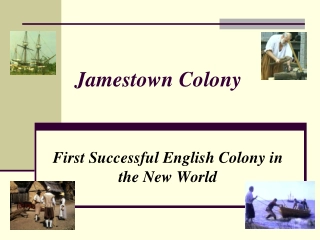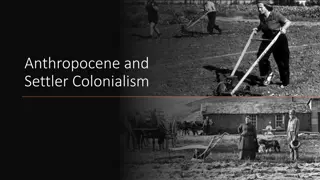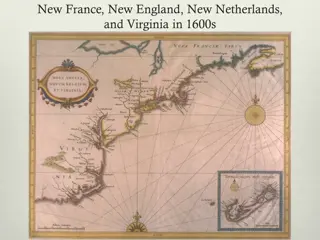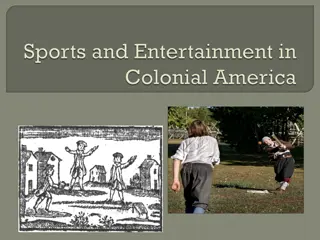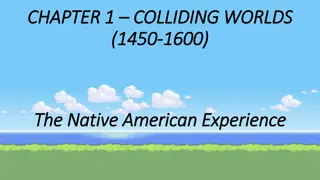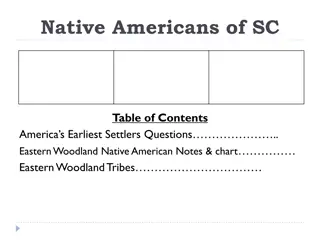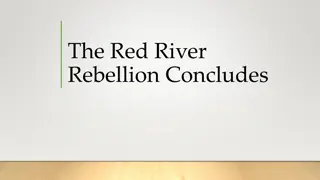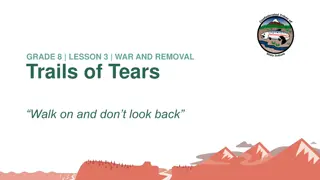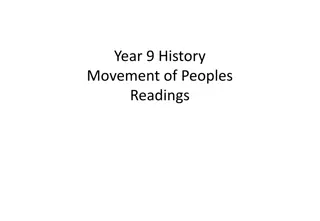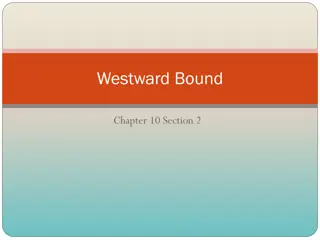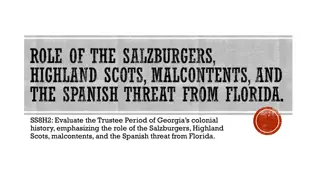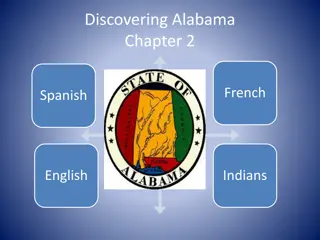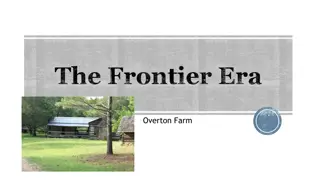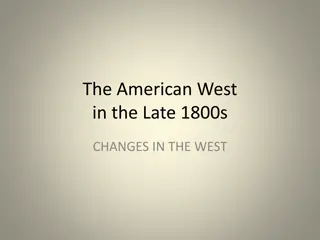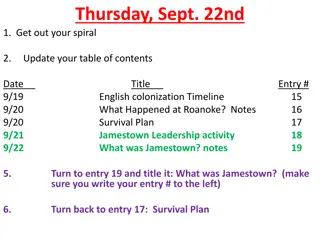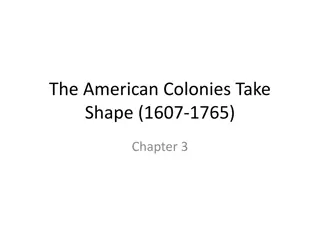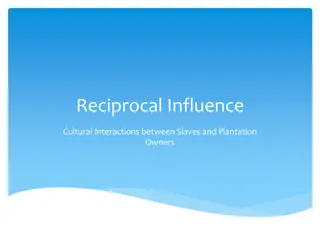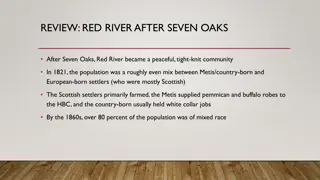Jamestown Colony
The reasons for English colonization, the hardships faced by settlers, and the interactions between the English settlers and the Powhatan people at Jamestown.
0 views • 25 slides
Understanding Settler Colonialism and Its Impact in the Anthropocene
Settler colonialism, a structure of domination, aims to permanently transfer settlers to Indigenous lands, leading to ongoing dispossession and conflict. This form of colonialism disrupts Indigenous nationhoods, political practices, and sovereignties. The dispossession of Indigenous bodies and lands
0 views • 8 slides
Colonization and Indigenous Perspectives in 1600s North America
Explore the colonization efforts in 1600s North America by New France, New England, New Netherlands, and Virginia, along with English settlers' perspectives on Native Americans. Discover the contrasting views on land use, settlement practices, and interactions with indigenous populations through his
6 views • 6 slides
Early Explorers in Western Virginia
Exploration of Western Virginia by early adventurers, including Abraham Wood and John Lederer, sheds light on the conflicts between French and English settlers. Discover the challenges and triumphs of these pioneers as they navigated unknown territories and interacted with indigenous peoples, leavin
3 views • 15 slides
Colonial Acts and Conflicts in American History
Key historical events such as the French & Indian War, the Proclamation of 1763, and the Quartering Act are explored, shedding light on critical laws, conflicts, and tensions that shaped colonial America. The discussion covers acts imposed by the British government, the impact on settlers and Native
5 views • 15 slides
Attitudes Toward Sports Among Colonial Settlers in the New World
The attitudes of European colonial settlers towards sports in New England, the Middle Colonies, and the South were deeply influenced by their religious backgrounds. While Puritans in New England were generally against play, Quakers and Dutch Calvinists in the Middle Colonies were more accepting. In
0 views • 19 slides
Understanding House Styles: A Brief Overview
House styles encompass a variety of architectural designs, with buildings classified based on shared characteristics like roof shape, window placement, and construction materials. Early American house styles, such as American Colonial, reflect the diverse origins of settlers in North America. Coloni
3 views • 25 slides
Tea Cultivation in India: A Comprehensive Overview
Tea cultivation in India has a rich history dating back to 1823 when British settlers discovered wild tea plants in Assam. Today, India is the second-largest tea producer globally. Major tea-producing regions include Assam, West Bengal, Tamil Nadu, and Kerala. The ideal conditions for tea growth inc
0 views • 11 slides
The Maori People of New Zealand: History and Culture
The Maori people were the first inhabitants of New Zealand, arriving around AD 1250-1300 from Eastern Polynesia. They lived in settlements called "pa" led by chiefs, with ceremonial meeting houses known as "wharenui". The Maori were hunter-gatherers, skilled in hunting moa birds and fishing. They pr
0 views • 13 slides
Manifest Destiny: The Annexation of New Mexico and California
The expansion of the United States into the territories of New Mexico and California, driven by the ideology of Manifest Destiny, involved a complex interplay of historical events including the Santa Fe Trail, Spanish missions in California, conflicts with Mexican settlers, and President Polk's stra
0 views • 11 slides
Exploring Early American Civilizations and Cultures
The journey through Chapter 1 delves into the collision of worlds between Native Americans and European settlers from 1450 to 1600. It uncovers the experiences of the first Americans, the rise of American empires like the Aztec and Incan civilizations, and the development of chiefdoms and confederac
0 views • 22 slides
Exploring the History of Grand Island: A Journey Through Time
Fourth-grade students embark on a school bus tour organized by the Grand Island Historical Society to learn about the rich local history of Grand Island, situated in the upper Niagara River. Discover the island's significance, settlers' arrival by boat, the legacy of Whitehaven Sawmill, and the tran
0 views • 12 slides
Native American Tribes of South Carolina: History and Impact
Explore the rich history of Eastern Woodland Native American tribes in South Carolina, including the Cherokee, Catawba, and Yemassee. Discover their unique lifestyles, governance structures, and interactions with European settlers, shedding light on their resilience and enduring cultural legacies am
0 views • 9 slides
Indian Water Rights Dispute in San Diego County
The Indian bands in the San Luis Rey River basin of San Diego County have faced water scarcity and economic hardships since settlers diverted the river's waters in the late 1800s. Negotiations and agreements have bound larger groups, impacting the livelihood of the indigenous communities. The histor
0 views • 16 slides
Design Your Moon Camp: Erasmus+ Mini-MOOC Project
Delve into the world of designing a Moon camp in this innovative Erasmus+ Mini-MOOC project. Participants are challenged to create a map of their ideal lunar settlement, considering the harsh lunar conditions such as lack of water, oxygen, high radiation, and scarce food sources. The project aims to
0 views • 4 slides
The Impact of the Red River Rebellion on Canadian History
The Red River Rebellion of 1869-1870 marked a pivotal moment in Canadian history, with Louis Riel leading the Metis in establishing a provisional government in response to fears of losing their power to settlers. John A. MacDonald's response, the execution of Thomas Scott, and the aftermath of Scott
0 views • 10 slides
Environmental Impact of Introduced Species in Australia
Early European settlers introduced various animals to Australia, leading to severe environmental consequences such as competition with native species, soil erosion, and changes in plant communities. The rabbit and fox are identified as major culprits causing significant harm to the ecosystem.
0 views • 36 slides
Legacy of West Falmouth: Unveiling History and Heritage with Grant Support
The posters and slide show funded through a grant from the Institute for Museum and Library Services shed light on the rich history and heritage of West Falmouth. Delving into the deep-rooted past of the Mashpee Wampanoag Tribe and the first European settlers in the region, the exhibits narrate the
0 views • 8 slides
Experienced Bank Executives in Wisconsin
Mr. Spitz and Mr. Fink are experienced bank executives in Wisconsin with extensive backgrounds in the banking industry. Mr. Spitz, the Founder & CEO of Settlers Bank, has over 30 years of experience ranging from community banking to corporate commercial lending. He is actively involved in his commun
0 views • 7 slides
Operation and Maintenance Aspects of Sanitation Systems
Maintenance of basic treatment processes, settlers, and anaerobic baffled reactors (ABR) is crucial for efficient functioning. Regular sludge removal, careful handling of pathogenic organisms, and monitoring scum levels are essential tasks. Anaerobic systems like ABR require a start-up period and sp
0 views • 32 slides
Trail of Tears Forced Removal from Oregon and California Coast
Joel Palmer and Federal Indian Policy oversaw the forced removal of Native peoples from Rogue River Valley and southern Oregon/northern California coast to the Siletz Coast Reservation between 1856-1860. The brutal journeys, including the First Removals in January 1856 and the harrowing Journey from
0 views • 22 slides
Interactive Learning Slides on Early American Settlements
Explore a series of interactive slides covering topics such as the disappearance of Roanoke settlement, the peace treaty between the Pilgrims and Wampanoags, challenges faced by Jamestown settlers, and more. Engage in activities like doodling, sit-ups, and writing exercises while learning about hist
0 views • 26 slides
Lord Dunmore's War and The American Revolution in West Virginia
Lord Dunmore's War in West Virginia during the American Revolution involved significant events such as the Proclamation of 1763, settlements by notable figures like Zackquill Morgan and the Zane family, conflicts like the Cresap Attack and Yellow Creek Massacre, and the Battle of Point Pleasant. The
0 views • 12 slides
History of European Colonization in America
The visual content and text describe the early colonization of America by Europeans, focusing on the establishment of colonies like New Sweden and New Netherland. It illustrates the interactions between European settlers and Native Americans, the competition for land, and the growth of colonies at t
0 views • 14 slides
Historical Movements: Gold Rushes and Colonization in North America and Australia
The reading explores the impact of the Gold Rush in California and Australia, leading to mass migrations in search of wealth and opportunities. It delves into the colonization efforts and expansionist pursuits of British control, discussing push and pull factors that influenced emigration to North A
0 views • 13 slides
Westward Expansion and Transportation Innovations in 19th Century America
Settlers moved westward into Illinois and beyond the Appalachians in the 1800s, leading to a significant population growth in the United States. Improved infrastructure such as roads, turnpikes, river travel, steamboats, and canals played crucial roles in facilitating transportation and trade during
0 views • 9 slides
Georgia's Trustee Period: Role of Salzburgers, Highland Scots, Malcontents, and Spanish Threat
German Salzburgers and Scottish Highlanders played crucial roles in Georgia's Trustee Period, settling in areas like Ebenezer and Darien, respectively. However, challenges such as poor land, restrictive regulations, and economic hardships plagued the colonists. The Spanish threat from Florida also l
0 views • 9 slides
Exploring Early Alabama: Europeans, Trade, and Native American Relations
In Chapter 2 of Discovering Alabama, the impact of French, Spanish, and English settlers on the Native American populations is explored. Key vocabulary such as immunity, bartered, cartographer, and more are highlighted. The lesson also delves into reasons for conflicts between Europeans and Native A
0 views • 69 slides
The Frontier Era: Settlers and Growth in Alabama
Discover the historical journey through Alabama's frontier era, from the earliest inhabitants at Stanfield-Worley Shelter to European contact and settlement, the impact of Alabama Fever, settling the Bear Creek Watershed, the Overton family's arrival and home construction, and the significance of Do
0 views • 11 slides
Challenges Faced by Native Americans in the American West during the Late 1800s
Many changes occurred in the American West during the late 1800s, with the influx of white settlers due to the California gold rush, Transcontinental Railroad construction, and fertile land discovery. These changes created significant problems for Native Americans, who were forced onto reservations
0 views • 21 slides
The Forgotten Legacy of King Philip's War
King Philip's War, a pivotal but often overlooked event in American history, resulted in the displacement of the native population in southern New England and marked the end of a way of life spanning centuries. The conflict stemmed from cultural misunderstandings, land disputes, and broken alliances
0 views • 14 slides
Revealing Insights into Ancient Egypt: Unit Test Study Guide Answers
Explore the intriguing world of Ancient Egypt through this comprehensive study guide, covering topics such as the significance of Nile River, hieroglyphs, King Tut, mummification, and the purpose of pyramids. Discover how ancient settlers thrived next to the Nile, the impact of flooding, materials u
0 views • 45 slides
American West Revision - Three Truths and a Lie
Explore key facts about the American West history through a fun game of "Three Truths and a Lie." Learn about the Homestead Act, Plains Indians, cattle ranching, the Open Range, policing in the West, early settlers, and farming innovations. Test your knowledge and uncover the true from the false in
1 views • 12 slides
Exploring Indiana: From Native American Tribes to Statehood
Indiana's history unfolds from the early Native American tribes in 8000 BC to European exploration and statehood. The region saw significant development during the Mississippian culture, and European settlers arrived in the 1670s. British rule persisted until the American Revolutionary War, shaping
0 views • 14 slides
English Colonization in North America: Lost Colony of Roanoke
Learn about the English colonization of North America, focusing on why England wanted colonies, the challenges faced by early settlers, the mysterious disappearance of the Roanoke colony, and theories surrounding its fate. Engage in writing prompts and explore historical events like the Mayflower Co
0 views • 12 slides
Evolution of Money: From Barter to Fiat Currency
The evolution of money traces back to barter economies where a mutual coincidence of wants was necessary for trade. Settlers in Colonial America used commodity money and fiat money, with specie coins becoming popular due to their mineral content. The term "dollars" originated from the German pronunc
0 views • 60 slides
Jamestown Survival Plan: Building and Leading a Colony
Learn about the survival plan implemented in Jamestown, including key strategies such as planting crops, trading with Indians, and maintaining discipline. Discover the challenges faced by the settlers, the importance of leadership, and the efforts to establish a thriving colony amidst hardships and
0 views • 14 slides
Immigration and Slavery in the American Colonies (1607-1765)
The American colonies experienced significant immigration, with English, Irish, and German settlers seeking a new beginning. Many English immigrants were indentured servants, while Irish and German immigrants faced push factors like war and religious persecution. Additionally, the slave trade played
0 views • 42 slides
Cultural Interactions Between Slaves and Plantation Owners in South Carolina
Enslaved and free Africans played a significant role in shaping the culture and economy of the South and South Carolina. The growth of the slave trade led to a population imbalance between African and European settlers. African contributions to agricultural development were essential, while resistan
1 views • 24 slides
Turbulent Times in Red River: A Historical Overview
Red River transitioned from a peaceful community to a land of tension as new settlers, primarily Protestant, arrived in the 1860s. Led by figures like John Christian Schultz, these settlers discriminated against the Metis and sought control over the settlement, leading to increased conflict as crop
0 views • 9 slides
